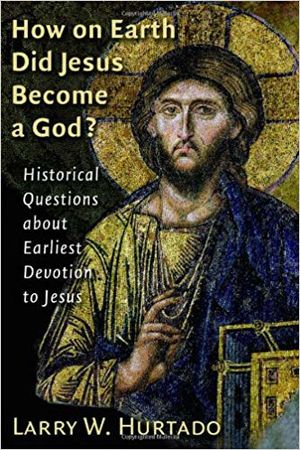How on Earth Did Jesus Become a God? (2005 Hurtado), book
How on Earth Did Jesus Become a God? Historical Questions about Earliest Devotion to Jesus (2005) is a book by Larry W. Hurtado.
Abstract
"In How on Earth Did Jesus Become a God? Larry Hurtado investigates the intense devotion to Jesus that emerged with surprising speed after his death. Reverence for Jesus among early Christians, notes Hurtado, included both grand claims about Jesus' significance and a pattern of devotional practices that effectively treated him as divine. This book argues that whatever one makes of such devotion to Jesus, the subject deserves serious historical consideration. Mapping out the lively current debate about Jesus, Hurtado explains the evidence, issues, and positions at stake. He goes on to treat the opposition to -- and severe costs of -- worshiping Jesus, the history of incorporating such devotion into Jewish monotheism, and the role of religious experience in Christianity's development out of Judaism. The follow-up to Hurtado's award-winningLord Jesus Christ (2003), this book provides compelling answers to queries about the development of the church's belief in the divinity of Jesus."--Publisher description.
As in his previous monographs, "One God, One Lord: Early Christian Devotion and Ancient Judaism" and "Lord Jesus Christ: Devotion to Jesus in Earliest Christinty," Hurtado asserts that within the matrix of Jewish monotheism the very early worship of Jesus shown to him by his followers was a unique and truly extraordinary innovation, which could only occur if early Christians conceived of Jesus as divine. Moreover, contra Dunn, Hurtado does not see a slow or gradual progression of Christology at play within the New Testament. Rather, he contends that the worship of a divine Jesus was "already robustly underway and taken for granted in the letters of Paul" (202). Surprisingly, though he shows clear familiarity with other Jewish literature from the Second Temple Period, he continues to argue that binitarian cultic devotion within early Christianity was utterly unique and without precedent within this larger Jewish religious milieu. Accordingly, in the end his argument that Jesus was thought to be divine simply because he was worshiped is difficult to maintain, especially in light of the "Son of Man" being worshipped in the Book of the Parables of Enoch, a point which, he conveniently, does not linger on. That being said, his thought-provoking thesis and larger discussion of Jewish monotheism during the Roman Period has sparked a lot of debate and the points touched upon in his scholarship continues to be, in at least some scholarly circles, a topic of much debate. ~Deborah Forger, University of Michigan
This collection of essays by Hurtado on Jewish Monotheism and early Christology includes two contributions by Horst-Heinz Deichmann and Roland Deines.
Editions
Published in Grand Rapids, MI: Eerdmans, 2005.
Translations
Contents
Issues and approaches.
- How on earth did Jesus become a God?: approaches to Jesus-devotion in earliest Christianity ; Devotion to Jesus and Second-Temple Jewish monotheistic piety ; To live and die for Jesus : social and political consequences of devotion to Jesus in earliest Christianity ; A "case study" in early Christian devotion to Jesus : Philippians 2:6-11
Definitions and defense.
- First-century Jewish monotheism ; Homage to the historical Jesus and early Christian devotion ; Early Jewish opposition to Jesus-devotion ; Religious experience and religious innovation in the New Testament
Epilogue.
- Appendix 1: opening remarks to the first Deichmann Annual Lecture Series / Horst-Heinz Deichmann
- Appendix 2 : are there good reasons for studying early Christian literature at Ben-Gurion University? / Roland Deines.
External links
- [ Google Books]
